This is the story of when everything changed. The story of the Russian, the mountain, the Ghost and me.
It’s going to be longer than the others, it has to be.
It has to contain pieces of a trip across a continent, an amazing life, small prairie towns, the green hell of Northern Ontario, and lakes as large again as oceans.
It has to contain whimsy and fear, sadness and joy, and the occasional fool fumbling around on a machine first designed in the 1930’s.
But most of all, it has to start with Jack. My Grandfather Jack, who was an interesting combination of ordinary and
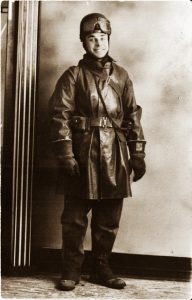
extraordinary himself. He was born in 1920, and left home at age 14 to work as a lumberjack because it was the great depression
and there wasn’t enough money coming in to support all of the children in the household. He felled trees with a saw and axe, with most of them destined to see a life as telephone poles across Vancouver island.
This wasn’t uncommon then – young men striking out on their own at an age that would be unthinkable now. But he it still must have been a shock to go almost straight from childhood things to a logging camp somewhere in the depths of the British Columbia wilderness.
He did this until the start of the Second World War, where he became a Despatch rider. (That’s his Despatch rider uniform in the picture to the left.) That’s an entirely different story, and if you are interested you can read an article I wrote for CMG a while back right here.
This is where the story begins, because this is where he learned to ride.
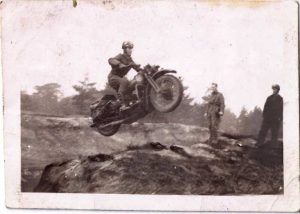
Really, really, ride.
This was riding off-road, through shell craters and at night through woods with a headlight that was anemic at the best of times and often further restricted with a blackout cover.
It was where he started a life long love affair with English motorcycles (He rode Harley’s and Indians as well, but his real love was the english bikes.) It was where he also learned mechanics, repairing and scrounging parts to keep his machine running.
And most importantly of all – certainly from my perspective – it was where he met my grandmother.
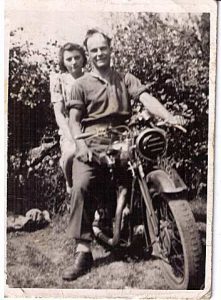
This is the two of them, on a date on his motorcycle in England during the war.
They married in England, and my father was born there (reportedly under a table during a Buzz Bomb attack.) After the war they resettled in Victoria BC and Jack worked as a firefighter for a while. Because evidently he hadn’t quite had enough risks taken during the war.
He eventually left this to go to work running his own chimney sweep business, and he bought an
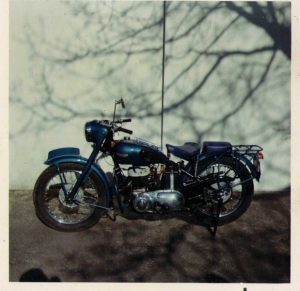
army surplus British bike which he painted in more civilian colours and
specifications in his spare time.
This was sold (as the family grew, and he had to build the family home and pay for a large group of children to go to school – but his fascination for two wheeled vehicles remained and just took somewhat new directions.
Antique bicycles mainly – and building Penny Farthing bicycles.
A Penny Farthing isn’t an ordinary bike. The front wheel is around 6 feet tall and t
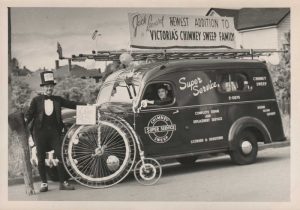
he pedals are fixed directly to the wheel so there isn’t any gearing to help get things started (or to disconnect the pedals when you are going downhill or at a great turn of speed.) To ride it, you had to get it moving and then jump up on a little step on the back and basically hurl yourself up to the seat six feet in the air, and then immediately start pedaling in the almost futile hope of keeping your balance.
Except of course for Jack.
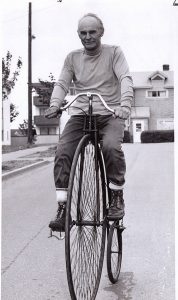
He competed on them, raced them, could do balancing acts for several minutes on them while remaining still.
I rode one once as a kid alongside my grandfather – a smaller, child sized version. I’m still amazed at how he could make that machine move. Riding effortlessly it seemed, tall and dapper in his tails and bowler hat, waving and smiling as he passed people who inevitably stared.
How could you not? It a chimney sweep on a Victorian bicycle with a handlebar moustache riding past. The only way it could have been more ludicrous, more impossible if there was dancing penguins somehow
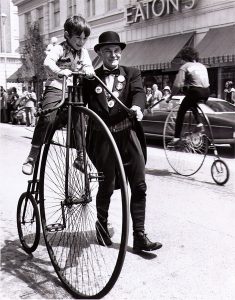
mixed into things. And if Jack could have gotten the Penguins I suspect he would have. He was a bit of a more benevolent, more mad P.T. Barnum. Always the showman.
He also restored bikes. At one point he had a collection of hundreds, and there are several museums and collectors who have bicycles in their collections that were restored by his hands.
Very capable hands, that also spent many hours helping neighbours and friends whenever possible. Jack had a very generous notion of family – and this frequently included everyone on the local street and surrounding neighbourhood.
By now you might be asking – how does this have to do with a ride that changed things?
In 2006, in December, Jack passed away.
My family – bunch of eccentrics themselves and knowing how Jack was about formal events – didn’t want a typical funeral. He would have hated that.
Instead, it would be a celebration – a closed street, food, balloons and a chance to remember someone who touched the lives of many people. It’d happen in June, and we’d have to get from our home in Toronto out to Victoria, BC.
Now, we certainly could have flown. That would have been the practical way to get there.
But we’d recently bought a Russian sidecar motorcycle, a Ural Tourist.
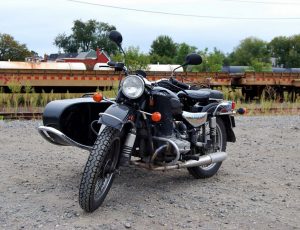
This was probably not the most practical machine to go across the country on. I was still not exactly experienced at long distance riding – if it wasn’t for my experience in the MBSR rally I probably wouldn’t have even considered the idea.
But the idea was there, and it was stuck. 5000km across Canada riding a machine first designed in the 1930’s. In June, when the weather could be erratic (and it was).
It was the only way I could go to Jack’s memorial, the only appropriate thing. It would be a week long moving memorial to a man who had been an ordinary father, an ordinary grandfather, and an incredible person in his actions on so many occasions.
But first I had to tell my wife I wanted to do this.
And oddly enough once I explained what I wanted to do…. she agreed we had to do it.
And that is where we started the real ride that changed everything.
(To be continued in part 2 of part 3… and yes at this point we might as well give up on numbering anything because we’ve confused everyone. Stay tuned next week for the next installment.)

Great story I can hardly wait for the next.
Next week for the next part so a small wait – but I think you’ll find the rest of the story interesting! (if occasionally embarassing for me 😉